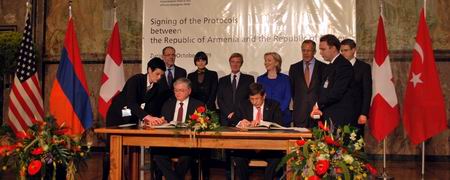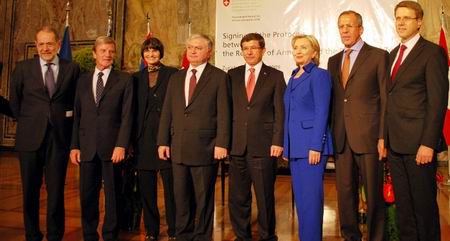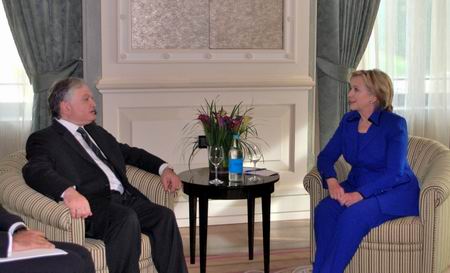The basis for the establishment of relations between Armenia and Turkey has been founded
11 October, 2009On October 10, in the main hall of the University of Zurich Foreign Ministers of Armenia and Turkey Edward Nalbandian and Ahmet Davutoğlu singed the Protocol on the establishment of diplomatic relations between the two countries and the Protocol on development of relations between Armenia and Turkey.
Head of the Swiss Federal Department of Foreign Affairs Micheline Calmy-Rey, US State Secretary Hilary Clinton, Foreign Minister of Russia Sergey Lavrov, Foreign Minister of France Bernard Kouchner, Secretary-General of the Council of the European Union Javier Solana and Foreign Minister of Slovenia Samuel Žbogar attended the ceremony.

The participation of high-ranking foreign officials in Protocols signing ceremony symbolizes the support of international community and the importance that is attached to the normalization of Armenian-Turkish relations.
The signing of Protocols is the logical result of the process aimed at the establishment of relations between the two countries without preconditions initiated last year by the President of Armenia. It could be beneficial for Armenian and Turkish people if those documents are translated into action as agreed, through implementing their provisions promptly, without preconditions and within reasonable timeframe.
Intensive day-to-day negotiations have enabled us to find a master key that should unlock the door and to provide an unprecedented opportunity to confidently step into the future.
Opening the ceremony Head of the Swiss Federal Department of Foreign Affairs Micheline Calmy-Rey congratulated Armenia and Turkey on the important achievement and mentioned that the courage of the sides and decisions taken will promote the establishment of stability and security in the region.

After the ceremony, Armenian Foreign Minister thanked the Foreign Ministers of Switzerland, United States of America, Russia, France, the European structures for supporting the process and said. “Today, you stand with us, participate in the signing ceremony, and truly, share the credit for the achieved results and also the responsibility for the future achievements”. By Minister Nalbandian’s definition, very important support of international community has been vital for the advancement of the process.
Speaking on the normalization of Armenian-Turkish relations Foreign Minister of Armenia mentioned. “From the very beginning of the process we were aware of the difficulties and obstacles on this thorny, but so much needed road. But we also realized that leaving this heavy burden to the future generations will be irresponsible and unjustified”.
After the signing of the Protocols during the conversation with journalists Foreign Minister of Russia Sergey Lavrov said. “We are really glad for the signing. The signing of documents is not only the first step, but it is also important that those should be ratified promptly”.

Secretary-General of the Council of the European Union Javier Solana also had a briefing with journalists and mentioned that the signed documents would have positive influence on the whole region. He expressed hope that the Protocols would soon be ratified by the Parliaments of the two countries and implemented.
Before the signing of Protocols Edward Nalbandian had a meeting with US State Secretary Hilary Clinton who reaffirmed the entire support for the normalization of relations between Armenia and Turkey.
UN Secretary General Ban Ki-Moon was among the first to welcome the signing of the Armenian- Turkish Protocols. In a written UN Secretary General stated. “This historic decision constitutes a milestone toward the establishment of good neighborly relations and the development of bilateral cooperation between both countries," the statement said." The secretary-general is confident that this development will also contribute to peace, security and stability in the South Caucasus hope that both protocols will be swiftly ratified by the Parliaments of Armenia and Turkey to ensure full normalization of their bilateral relations”.

